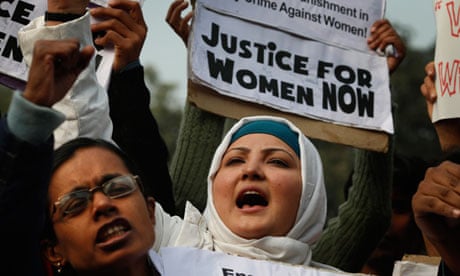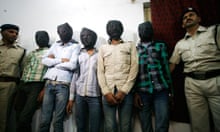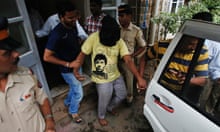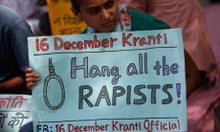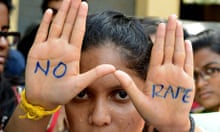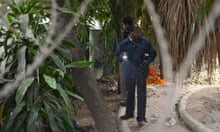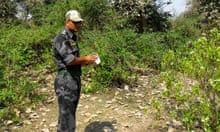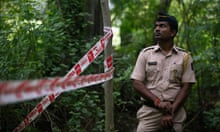Soon the narrow lane with dirt floor that leads through the leaning tenements and market stalls will be a distant memory. So too will the evening ritual of spreading out a plastic sheet over a bed to turn it into a dining table. Food will no longer be prepared in a tiny kitchen crammed with spotless tin utensils. The four toothbrushes – once five – will no longer be stored in a battered plastic holder outside the washroom.
Thousands of families move to better accommodation every day in Delhi. A marginally lesser number slip into greater poverty. And so India moves, incrementally but seemingly ineluctably, towards prosperity.
But the move that will take these two young men and their parents from a two-room basement to a spacious "middle-income" government-built apartment with running water and continuous power is far from ordinary. Nor has it much to do with a new "India Shining". The new home is a gift from the local authorities and, in the cold language of bureaucrats, described as "compensation" for the death of the young woman, their daughter and sister, who died of injuries sustained during a brutal gang rape by six men three months ago this week.
The incident prompted a global outcry, weeks of protests in India and calls for a wide-ranging legal and policing reform. It led to a fierce debate on the wave of sexual violence to women in India and the social attitudes that some say are responsible.
On Monday, the principal accused in the rape case, Ram Singh, 33, was found hanged in Delhi's Tihar prison. An inquiry has been launched into what India's minister for home affairs admitted was a "serious security lapse". The victim's eldest brother, 20, said the family was disappointed the man had been able to chose the time of his own death.
Singh was on trial with five others at a specially established fast-track court in Delhi and faced the death sentence.
In an interview with the Guardian, the 23-year-old victim's father remembered the moment when a policeman rang him, at about 10pm on a cold December evening, to tell him there had been an "accident" and that he would find his daughter at a hospital 10 miles across the city from his home in the scruffy outlying suburb of Dwarka.
A friend with a motorbike took him through Delhi's busy traffic. "She was lying on a stretcher, covered by a green blanket," he said. The family have not been identified in the Indian press due to strict local laws.
"I thought she was unconscious but when I laid my hand on her forehead she opened her eyes. She was crying. I told her: 'It'll be alright, beta [child]'."
Hours later came bad news.
"I was waiting outside the operating theatre. A doctor came out. He said she would probably not last more than a few hours, certainly more than a day or so," the father said.
But the girl held on much longer, twice giving a crucial statement to investigators. On 25 December, she closed her eyes for the last time.
"During the evening, maybe 9pm, she saw me standing outside the intensive care unit.
"She turned to look at me and gestured for me to come. She asked me if I had eaten. I said yes. Then she said: 'Dad, go to sleep, you must be tired.' I patted her head. She said: 'You should get some sleep.'
"She took my hand and kissed it. That moment hurts me more every time I think about it. She never opened her eyes again."
His daughter died days later, in a clinic in Singapore where she and the family had been flown by the Indian government for specialised treatment.
Unlike many parents in India, where sons are usually favoured, the family had spared nothing for their daughter.
A first son had died days after being born and the new child was so welcome "we did not care if it was a boy or a girl as long as it survived," the father said.
She was born in Delhi. Her father had moved to the city from his village in a remote part of the poor, lawless northern state of Uttar Pradesh. He left, reluctantly, his patch of inherited land too small to provide for a family. "I had no choice. I had to move to the city to have a chance of a better life," he said.
He worked in factories and, in recent years, as a loader at Delhi's domestic airport, working double eight-hour shifts unloading planes from places he could never visit to bring home 200 rupees (£2.50) every day.
With no savings, he sold part of his land and mortgaged the rest to raise the 45,000 rupees (£600) annual fee for his daughter's training as a physiotherapist at a college in the northern city of Dehradun.
The young woman worked in call centres to cover the 50,000 rupees (£660) living expenses. The family hoped that her earnings would eventually be enough to pay for the college fees of her two younger brothers and perhaps a better life.
In their small home, stifling in the 45C heat of the Delhi summer, freezing in the chill winters, the young woman had a bedroom to herself, to sleep and, above all, to study.
The rest of the family slept next door in the only other room. She covered a wall in notes and posters – not of Bollywood stars as many Indian teenagers would have done – but of formulae and diagrams culled from her science text books.
"I read somewhere that pulling yourself out of poverty means working like a horse and living like a saint. That is what I have always done. That is what my children have been taught to do. That is what my daughter did," her father said.
In death, she has transformed her family's life. Not only are they moving to a new home, of a size and standard they could never have been able to afford, but three separate state governments have made payments worth £50,000. Previously, the family's entire savings never amounted to more than a the equivalent of £100. Her 18-year-old brother has been given a coveted job in a subsidiary of Indian railways.
The family have not been attending the trial.
"What would I do if I saw them? I'd want to kill them but I am helpless," the father said. The men now facing the death penalty for the assault that took place in a moving bus and the brother said on Monday the suicide of the alleged ringleader should change nothing. A juvenile also detained for his role in the attack should be hanged, too, he added.
"I have faith in the government. Every citizen should trust the government of his country to see that justice is done," the father explained.
He and his wife chose their new home close to where they have lived for decades and where their children grew up. Only a few days ago, they packed her clothes and books away.
"I console myself that she was a good soul, set free in death," he said.
